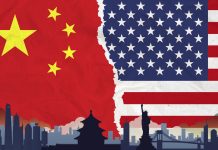BEIJING: The root cause and source of the power of a political party that has seen its membership explode from 50-plus individuals to over 95 million lies in its faith and ability to serve the people.
In a world where the crisis of political representation is prompting a populist surge of disgruntlement across the Atlantic, the 100-year-old Communist Party of China (CPC) is upholding its time-honored philosophy of putting the people first, which is the key to both its success and its future.
Xi Jinping, general secretary of the CPC Central Committee, said the people are the “supreme and ultimate judge” of the Party’s work.
Although political parties vary in their political stances, goals and visions, the performances of all parties can be measured by one universal yardstick — how effectively they have served the people.
The CPC has not failed the people it represents. The world’s largest political party has developed a bond with the Chinese people, a relationship often described as being as inseparable as “fish and water” or “flesh and blood.”
Just like Antaeus, the giant in Greek mythology who drew his power from the earth, the CPC has been drawing its inexhaustible strength from the Chinese people.
The Chinese people’s support for the CPC stems from its people-centered governing philosophy.
The CPC has no missionary impulse to “conquer the world,” as some biased observers have claimed, nor the intention to export its ideology or development model. Its efforts are motivated solely by the betterment of people’s lives.
The state is the people, and the people are the state. Standing on the people’s side represents the fundamental political stance of the CPC, and it is what distinguishes a Marxist political party from other political parties.
At its conception, the CPC established its original aspiration and mission — seeking happiness for the Chinese people and rejuvenation for the Chinese nation. A century on from its founding, the Party’s leadership is repeatedly asking all its members to remain true to this principle.
In some Western countries, the ruling parties have been reduced to serving only a few, becoming political organizations “of the 1 percent, by the 1 percent, for the 1 percent.” In contrast, the CPC has remained committed to representing the fundamental will of the majority of the people.
Under the leadership of the CPC, China seeks a people-centered modernization that is different from the Western model in which capital is the primary driver and dominant logic. This is best illustrated by China’s massive poverty-alleviation campaign and its handling of the COVID-19 epidemic, where such concepts and practices as “No one should be left behind” and “People first, life first” have been demonstrated.
The Chinese people’s support for the CPC stems from its uncompromising self-sacrifice.
Born at a time when the Chinese economy — once the world’s largest — had been crippled by foreign invasions and domestic divisions, the fledgling CPC adopted its stance despite great hardship and danger.
Chinese Communists are willing to sacrifice everything, including their lives, for the interests of the people. Nearly one-quarter of the 171 members and alternate members of the CPC central committees before the founding of New China gave up their lives for the Party’s cause, according to a report published by the New China Research think tank affiliated to Xinhua. Data showed that as many as 3.7 million CPC members sacrificed their lives from 1921 to 1949 in striving for the establishment of the people’s republic. Many others died anonymously.
This spirit of sacrifice has been carried forth to the present day. Nearly 400 of the over 39 million CPC members and cadres who fought against COVID-19 on the front lines died in the process, according to official numbers.
The Chinese people’s support for the CPC stems from their experience of its good governance. In the early 20th century, revolutions, restorations and warlordism failed to change China’s fate because of the absence of participation by the Chinese people.






